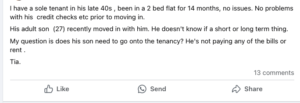
When a tenant’s family member moves into a rental property, it’s important to understand how this may impact the tenancy agreement and your responsibilities as a landlord. Here’s a detailed breakdown of your situation:
- Does the Son Need to Be Added to the Tenancy Agreement?
Technically, if the son is not contributing to the rent or bills and is simply living there temporarily as a guest, he does not need to be added to the tenancy agreement. However, if his stay becomes long-term (e.g., several months or more), you may want to consider adding him to the agreement as a permitted occupier or a joint tenant, depending on the arrangement. - Permitted Occupier vs. Tenant:
- A permitted occupier is someone allowed to live in the property but has no legal rights or responsibilities under the tenancy agreement. This might suit the current situation since the son isn’t paying rent or contributing financially.
- If the son stays indefinitely and begins to share financial responsibility, you might consider making him a joint tenant, which would involve a formal update to the tenancy agreement.
- Your Legal Obligations:
- Right to Rent Checks: As a landlord in England, you are required to carry out Right to Rent checks on anyone aged 18 or over living in the property, even if they are not on the tenancy agreement. This applies to the son if he’s staying there for an extended period.
- Insurance and Mortgage Considerations: Check your landlord insurance and mortgage terms to see if additional adult occupants need to be declared.
- Communication with Your Tenant:
It’s a good idea to have a conversation with your tenant to clarify the son’s situation. Ask if his stay is temporary or likely to extend long-term, and let them know if and when you’d need to formalize his presence in the property. - Documenting the Situation:
For now, you can document the son as a permitted occupier (if appropriate) in case his stay exceeds a typical “guest” period. This ensures transparency and protects you legally.
In summary, if the son’s stay is temporary, no changes are required immediately. If it becomes long-term, updating the tenancy agreement or recording him as a permitted occupier would be a sensible next step. Always ensure Right to Rent checks are completed for compliance.